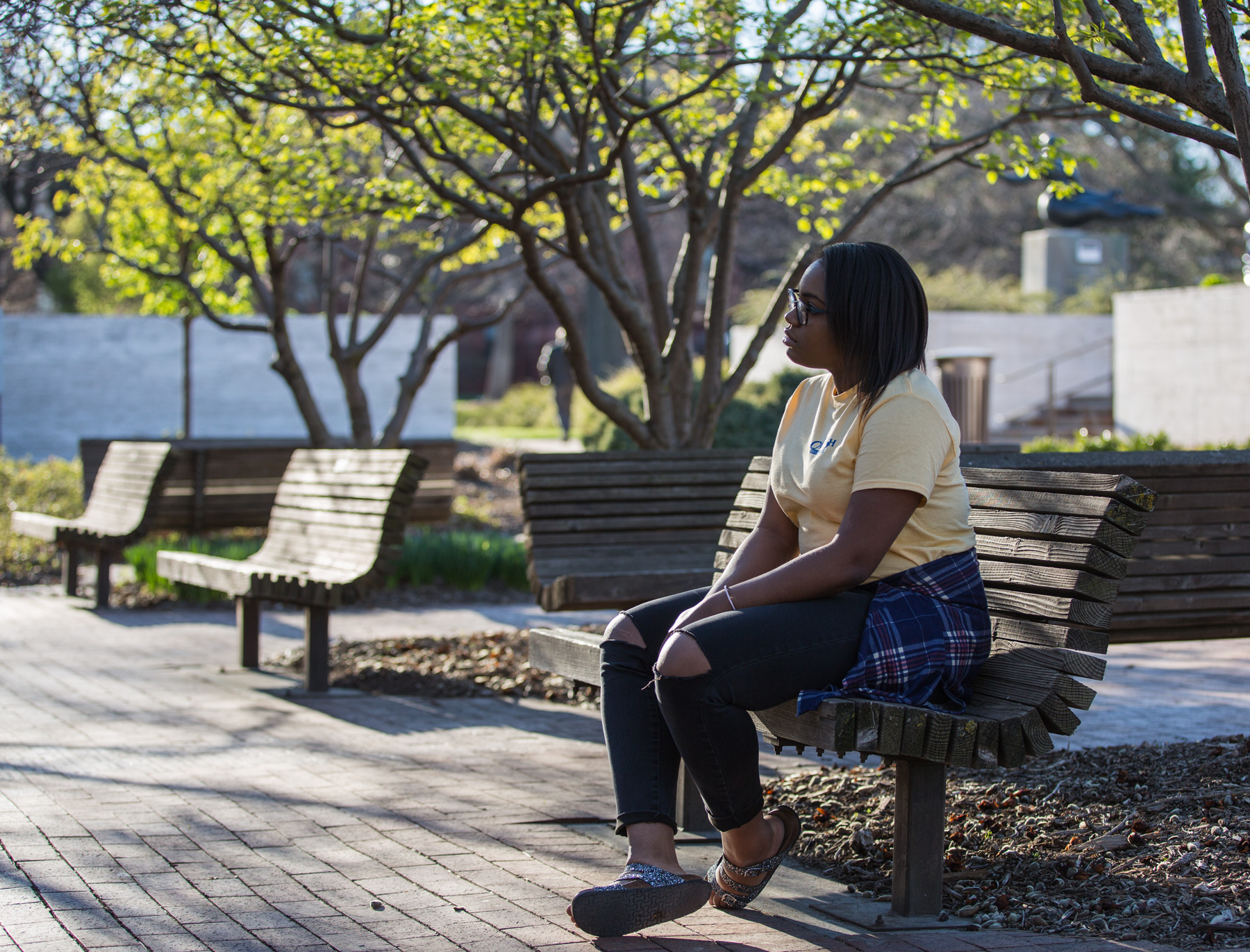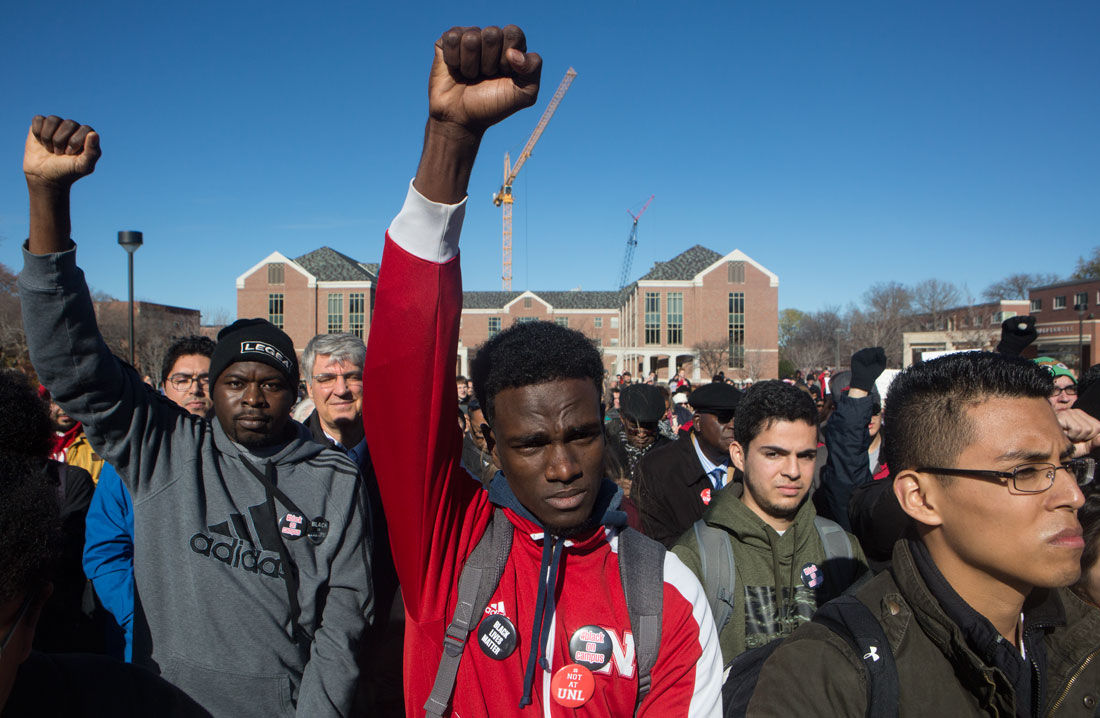

Students and administrators at UNL weigh free speech concerns against values of tolerance, diversity and inclusivity
Kendall Dawson just wanted pizza. She and her then-boyfriend were crossing Q Street near the Van Brunt Visitors Center heading to Toppers.
That’s when they heard it.
“N***er!”
The word was flung out a window of a dark-colored truck by a person who looked like a drunk, college-aged, white boy, Dawson said. The friends laughed from inside of the truck, she remembered. After a moment, he pulled his head back in the window and the truck sped off down Q Street.
The moment is one that has come to haunt the sophomore pre-law major at the University of Nebraska-Lincoln in subtle ways.
“Situations like this do make me a little more wary of campus because UNL was a place I never thought I would experience this type of thing,” Dawson said. “Whenever I see trucks driving downtown, I do get flashbacks.”
UNL is a school that consistently announces its dedication to inclusivity and diversity. In its Core Values and Beliefs of Diversity and Inclusion, adopted in 2006, the university states that to achieve true excellence, individuals must be able to work and learn in an atmosphere of dignity and acceptance.
“Our commitment to diversity and inclusion requires each of us to continuously ensure our interactions be respectful, protect free speech and inspire academic freedom,” the Values and Beliefs read.
But for some such as Dawson, and others she’s talked to at her position as president of the Afrikan People’s Union, the student government for African-American/Black students, this commitment to a respectful, accepting environment and protecting free speech is sometimes hard to mutually achieve.
of students say they believe campus administrators respond appropriately to concerns about diversity and racial climate on campus.
UNL Chancellor Ronnie Green recognizes the challenge because on one hand, the First Amendment is integral to the endurance of the university’s mission.
“The First Amendment is a bedrock principle that we operate under,” Green said. “We absolutely believe that you can’t learn without full expression of ideas and understanding.”
The problem that arises on college campuses, he said, is determining where to draw the line when freedom of speech begins to be seen as a threat to some students’ safety. For Green, that’s the “rub” of the First Amendment.
“The challenge with freedom of speech is how you allow any individual to express their view, their opinions, or their thoughts in a free society without speech becoming a tool of harm,” Green said.
Like her experience on Q Street, Dawson also said she has been attacked with racial slurs on the social media app, Yik Yak, for supporting UNL’s Black Lives Matter rally.
Dawson said she is a strong proponent of the Black Lives Matter movement, which can be challenging at a predominately white institution because she isn’t always sure of how her activism will be received by her peers.

Before attending UNL, Dawson attended Omaha North High Magnet School, one of the most diverse high schools in Omaha. Dawson said the transition from high school to college was made significantly more challenging because UNL is significantly less diverse.
“My experience [at UNL] has been mostly positive,” Dawson said. “However, there have been multiple instances where I have felt uncomfortable being a person of color, especially after the recent election.”
The political climate of the United States before, during and after the 2016 presidential election has heightened tensions on campuses all across the country, including UNL.
Dawson said she understands the actions of these individuals don’t reflect the entirety of the student body, but the incidences are still disheartening to her.
And while the university’s mission, stated in its Core Values and Beliefs, imply no student should feel unsafe on campus, when it comes to university administration addressing these issues, it puts them between a rock and a hard place.
At the beginning of the 2016 fall semester, UNL Chancellor Ronnie Green broached this subject in a welcome-to-campus statement encouraging the UNL community to support diversity and inclusion.
“... our beliefs on diversity and inclusion represent the way we operate. They are not-negotiable,” Green said in the statement.
Green caught flak from free speech supporters because some felt his comments on diversity were infringing upon the First Amendment rights of students.
- UNL Chancellor Ronnie Green
“We operate on a model of civic discourse, that’s what the academy is,” Green said. “We weren’t saying that you can’t do that, we were saying that we see ourselves as a place where we have civil discussions.”
Green went on to explain that following the election in November, some female Middle-Eastern students came to him expressing that they felt unsafe on campus because, as they described it, white men had thrown racial slurs at them.
Green said the women were victims of hate speech, however the men involved were exercising their First Amendment rights.
“Do they have the right to say that? Unfortunately, yes,” Green said.
Green defined the reported incidents as hate speech, saying students were using speech in a way that is defined by the person they were directing the speech at, using attributes of the person as insults. Green maintained that the men were acting within their First Amendment rights.
Green explained there have been instances of hate speech and non-inclusive speech on UNL’s campus, but not anything compared to other universities such as the protests at Mizzou regarding race, workplace benefits and leadership.
“There’s just been a little blip here, a little blip there,” Green said.
Green said he was expecting the UNL community to be impacted by the political climate in a much stronger way than it has, describing it as much more moderate than he thought it would be.
Dawson said that although it may be difficult, the university should police hate and non-inclusive speech.
“If there is documentation such as on social media, I think the university should take action if it is presented to them,” Dawson said. “Although I think it may be difficult to have a single, linear definition of hate speech so it does leave room for administrative discretions.”
Through her position with the APU, Dawson has been able to work with other students who have experienced similar aggressions.
“A few people I’ve heard from have been harassed by the police, had their hair touched without their consent, were overtly stereotyped and called racial slurs,” Dawson said. “I wish there was a way to ensure that no one ever had to feel unsafe because of their race.”
Green said he wants students to know the university welcomes all views and all speech, but there is a civil and respectful way to do that and have those conversations. However, opinions can still clash in harsh ways and sometimes that leaves university administration with difficult decisions.
“What is respectful for you may not be respectful for another person, and that’s the challenge,” Green said. “How do you police that?”
Amy Miller, Legal Director of the American Civil Liberties Union of Nebraska said the First Amendment serves to protect controversial speech.
“Nobody ever gets in trouble for shouting ‘Go Big Red!’ because a lot of people agree with that, but people who shout something that gets under people’s skin is where you end up seeing hot spots,” Miller said.
Although the First Amendment does protect controversial speech, it does not protect threats. Under Nebraska state law, threats fall into a separate category and can be prosecuted as terroristic threats.
Miller said education is vital in protecting students on college campuses from hate and non-inclusive speech.
“Having groups pull together and educate their members on how to put their voices together to amplify them, we think is one of the easiest ways to combat this,” Miller said. “Have your student group get together and say what they think of bigots, racists and haters.”
Miller said she understands it is painful to be victimized, but we can’t silence people we disagree with because that is the fundamental free speech underpinnings of our democracy. When looking at history, it’s almost always the disenfranchised or marginalized groups that get silenced.
“This is a little outside of the constitutional realm, but education changes hearts and minds all the time,” Miller said.
In addition, Dawson said it is important to realize the impact your words can have on people.
“It’s important for people to know that just because the First Amendment protects one’s right to free speech, that doesn’t mean people can’t be offended by what you say,” Dawson said. “Sure you have the right to say it, but that doesn’t mean that it falls on deaf ears.”